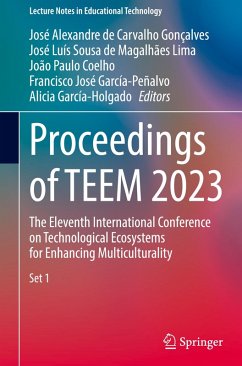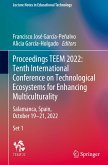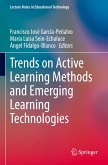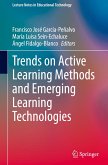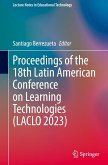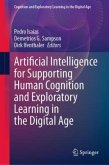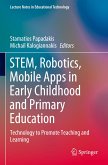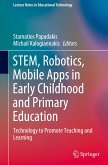Proceedings of TEEM 2023
The Eleventh International Conference on Technological Ecosystems for Enhancing Multiculturality
Herausgegeben:Gonçalves, José Alexandre de Carvalho; Lima, José Luís Sousa de Magalhães; Coelho, João Paulo; García-Peñalvo, Francisco José; García-Holgado, Alicia
Proceedings of TEEM 2023
The Eleventh International Conference on Technological Ecosystems for Enhancing Multiculturality
Herausgegeben:Gonçalves, José Alexandre de Carvalho; Lima, José Luís Sousa de Magalhães; Coelho, João Paulo; García-Peñalvo, Francisco José; García-Holgado, Alicia
- Gebundenes Buch
- Merkliste
- Auf die Merkliste
- Bewerten Bewerten
- Teilen
- Produkt teilen
- Produkterinnerung
- Produkterinnerung
This proceedings volume presents outstanding advances, with a multidisciplinary perspective, in the technological ecosystems that support Knowledge Society building and development. With its learning technology-based focus using a transversal approach, TEEM is divided into thematic and highly cohesive tracks, each of which is oriented to a specific community of interest, including researchers, professionals and students. Informatics and Education are the central issues in the conference tracks, including broad-scope research areas, such as Educational Assessment and Orientation, Human-Computer…mehr
Andere Kunden interessierten sich auch für
![Proceedings TEEM 2022: Tenth International Conference on Technological Ecosystems for Enhancing Multiculturality Proceedings TEEM 2022: Tenth International Conference on Technological Ecosystems for Enhancing Multiculturality]() Proceedings TEEM 2022: Tenth International Conference on Technological Ecosystems for Enhancing Multiculturality123,99 €
Proceedings TEEM 2022: Tenth International Conference on Technological Ecosystems for Enhancing Multiculturality123,99 €![Trends on Active Learning Methods and Emerging Learning Technologies Trends on Active Learning Methods and Emerging Learning Technologies]() Trends on Active Learning Methods and Emerging Learning Technologies41,99 €
Trends on Active Learning Methods and Emerging Learning Technologies41,99 €![Trends on Active Learning Methods and Emerging Learning Technologies Trends on Active Learning Methods and Emerging Learning Technologies]() Trends on Active Learning Methods and Emerging Learning Technologies41,99 €
Trends on Active Learning Methods and Emerging Learning Technologies41,99 €![Proceedings of the 18th Latin American Conference on Learning Technologies (LACLO 2023) Proceedings of the 18th Latin American Conference on Learning Technologies (LACLO 2023)]() Proceedings of the 18th Latin American Conference on Learning Technologies (LACLO 2023)171,99 €
Proceedings of the 18th Latin American Conference on Learning Technologies (LACLO 2023)171,99 €![Artificial Intelligence for Supporting Human Cognition and Exploratory Learning in the Digital Age Artificial Intelligence for Supporting Human Cognition and Exploratory Learning in the Digital Age]() Artificial Intelligence for Supporting Human Cognition and Exploratory Learning in the Digital Age119,99 €
Artificial Intelligence for Supporting Human Cognition and Exploratory Learning in the Digital Age119,99 €![STEM, Robotics, Mobile Apps in Early Childhood and Primary Education STEM, Robotics, Mobile Apps in Early Childhood and Primary Education]() STEM, Robotics, Mobile Apps in Early Childhood and Primary Education112,99 €
STEM, Robotics, Mobile Apps in Early Childhood and Primary Education112,99 €![STEM, Robotics, Mobile Apps in Early Childhood and Primary Education STEM, Robotics, Mobile Apps in Early Childhood and Primary Education]() STEM, Robotics, Mobile Apps in Early Childhood and Primary Education113,99 €
STEM, Robotics, Mobile Apps in Early Childhood and Primary Education113,99 €-
-
-
This proceedings volume presents outstanding advances, with a multidisciplinary perspective, in the technological ecosystems that support Knowledge Society building and development. With its learning technology-based focus using a transversal approach, TEEM is divided into thematic and highly cohesive tracks, each of which is oriented to a specific community of interest, including researchers, professionals and students. Informatics and Education are the central issues in the conference tracks, including broad-scope research areas, such as Educational Assessment and Orientation, Human-Computer Interaction, eLearning, Computers in Education, Communication Media and Education, Medicine and Education, Learning Analytics, Engineering Education, Robotics in Education, Mechatronics, Diversity in Education, Gamification and Games for Learning.
Hinweis: Dieser Artikel kann nur an eine deutsche Lieferadresse ausgeliefert werden.
Hinweis: Dieser Artikel kann nur an eine deutsche Lieferadresse ausgeliefert werden.
Produktdetails
- Produktdetails
- Lecture Notes in Educational Technology
- Verlag: Springer / Springer Nature Singapore / Springer, Berlin
- Artikelnr. des Verlages: 978-981-97-1813-9
- 2024
- Seitenzahl: 1560
- Erscheinungstermin: 5. August 2024
- Englisch
- Abmessung: 241mm x 160mm x 94mm
- Gewicht: 2640g
- ISBN-13: 9789819718139
- ISBN-10: 9819718139
- Artikelnr.: 69968655
- Herstellerkennzeichnung
- Springer-Verlag GmbH
- Tiergartenstr. 17
- 69121 Heidelberg
- ProductSafety@springernature.com
- Lecture Notes in Educational Technology
- Verlag: Springer / Springer Nature Singapore / Springer, Berlin
- Artikelnr. des Verlages: 978-981-97-1813-9
- 2024
- Seitenzahl: 1560
- Erscheinungstermin: 5. August 2024
- Englisch
- Abmessung: 241mm x 160mm x 94mm
- Gewicht: 2640g
- ISBN-13: 9789819718139
- ISBN-10: 9819718139
- Artikelnr.: 69968655
- Herstellerkennzeichnung
- Springer-Verlag GmbH
- Tiergartenstr. 17
- 69121 Heidelberg
- ProductSafety@springernature.com
José Alexandre de Carvalho Gonçalves received the Bachelor, Master and PhD degrees in Electrical Engineering and Computers from the University of Porto, Portugal, in 2000, 2005, and 2009 respectively. He is Professor at the Polytechnic Institute of Bragança (IPB), Portugal in the subjects of Automation, Robotics, Embedded systems, and Electronics and Instrumentation. He has been a senior member of the Robotics and Intelligent Systems research group from Institute for Systems and Computer Engineering, Technology and Science (INESC-TEC) since 2009, and he has also been a researcher since 2019 at The Research Centre in Digitalization and Intelligent Robotics-Polytechnic Institute of Bragança (CeDRI-IPB). His main research areas are localization, navigation, control and prototyping of mobile robots. He is former President of the Automatic Control Portuguese Association and Director of the Master of Industrial Engineering of IPB. He is currently head of the Electrotechnical Laboratory of CeDRI-IPB research group and Director of the Superior Technological Course in Automation, Robotics and Industrial Electronics of IPB. José Lima received the Master of Science and PhD in Electrical and Computer Engineering in the Faculty of Engineering of University of Porto, Portugal in 2001 and 2009. He joined the Polytechnic Institute of Bragança in 2002, and currently he is a Coordinator Professor and head of the Electrical Engineering Department of that school. He is also a vice coordinator of the Research Centre in Digitalization and Intelligent Robotics, and Member of the coordination council of the Centre for Robotics in Industry and Intelligent Systems group of the INESC TEC (Institute for Systems and Computer Engineering of Porto, Portugal). He has published more than 200 papers in international scientific journals and conference proceedings. In addition, he has participated and juried some autonomous mobile robotics competitions and developed industrial applications. Moreover, his research interests are in the field of mobile robotics, simulation and IoT. He participated as researcher or Principal Investigator in some national, FP7 and H2020 funded projects. João Paulo Coelho is Professor at the Polytechnic Institute of Bragança, Portugal. He is also a researcher at The Research Centre in Digitalization and Intelligent Robotics (CeDRI) and holds a Ph.D. degree in computational intelligence applied to agricultural greenhouses. He has been involved, as a research member, in several scientific projects, at both national and at the European level. His research interests include control systems design, machine learning, electronic instrumentation, embedded systems and discrete-event computer simulation. Besides several publications in both international conferences and journals, he also authored the book 'Hidden Markov Models: Theory and Implementation Using MATLAB'. Francisco José García-Peñalvo is a Professor in the Department of Computer Science and Automation at the University of Salamanca (USAL), Spain, with four six-year periods of research, one six-year period of transferring and innovation, and five five-year periods of recognized teaching. Professor García-Peñalvo received the Gloria Begué award for teaching excellence in 2019, and the Maria de Maeztu award for research excellence in 2023. He was a Distinguished Professor at the School of Humanities and Education at the Tecnológico de Monterrey, Mexico (2016-2018), and is a Researcher of International Impact at the Universidad Nacional San Agustín, Arequipa, Peru. Since 2006, he has been the head of the Research Group Recognized by the USAL GRIAL (The research GRoup of InterAction and e-Learning). He is currently the Deputy Director of the Research Institute for Educational Sciences, the Rector's Delegate for Digital Learning and Teaching, and the Coordinator of the Doctorate Programme in Education in the Knowledge Society at USAL. He is Editor-in-Chief of the journals Education in the Knowledge Society and Journal of the Information Technology Research, and Associate Editor of many other journals, such as IEEE Transactions on Learning Technologies, IEEE Access, Computers in Human Behavior, and Computers in Human Behavior Reports. He has also published more than 100 research papers in journals. Alicia García-Holgado is currently an Associate Professor of Computer Science at the University of Salamanca, Spain. She belongs to the GRIAL (research GRoup in InterAction and e-Learning), focusing on developing technological ecosystems for knowledge management, and learning processes in heterogeneous contexts. Additionally, she leads the research line on promoting diversity and inclusion in the STEM (Science, technology, engineering, and mathematics) field. She is also board member of the Women in Computing Committee of the Scientific Society of Spanish Informatics, and coordinator of the CLEI (Latin American Centre for Computer Science Studies) Community for Latin American women in computing. She participated in more than 50 national and international research projects.
Computational thinking and robotics in education.- Engineering Education: Teachers' and Students' Competences Recent Developments.- Technological Applications in Medical Training and Practice.- Implementation of Qualitative and Mixed Methods Researches.- Bridging the diversity gap in STEM.- Lab-based Education in STEM.- Identity, technology and education. Identity construction processes in hyperconnected ecosystems.- Gamification and Games for Learning (GAMILEARN).- Smart Learning.- Communication, Education and Social Media.- Educational Assessment and Guidance.- Advances on Sustainable Development in Higher Education.- Educational Innovation.- New trends in mechatronics engineering education.- Those were the days! Looking back at Ten Years of Learning Analytics at TEEM.- Doctoral Consortium.
Computational thinking and robotics in education.- Engineering Education: Teachers' and Students' Competences Recent Developments.- Technological Applications in Medical Training and Practice.- Implementation of Qualitative and Mixed Methods Researches.- Bridging the diversity gap in STEM.- Lab-based Education in STEM.- Identity, technology and education. Identity construction processes in hyperconnected ecosystems.- Gamification and Games for Learning (GAMILEARN).- Smart Learning.- Communication, Education and Social Media.- Educational Assessment and Guidance.- Advances on Sustainable Development in Higher Education.- Educational Innovation.- New trends in mechatronics engineering education.- Those were the days! Looking back at Ten Years of Learning Analytics at TEEM.- Doctoral Consortium.

